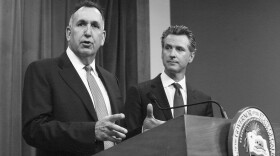U.S. air carriers Delta and Northwest have proposed a merger that, if approved, would create the world's largest airline, in terms of traffic. But first, the deal must win the approval of antitrust regulators and company shareholders, as well as unions.
Here, a look at what the deal means for the airline business and the flying public:
Why did Delta and Northwest decide to merge?
The two airlines hope that by joining forces, they can save money on rising fuel costs and create as much as $1 billion in cost savings from combining their international and domestic routes. Delta CEO Richard Anderson said the deal will create a carrier that "can effectively compete and win in the global marketplace."
Where will the new airline fly?
The new company, which will operate under the name Delta, will maintain a blend of 60 percent domestic flights and 40 percent international flights with service to nearly 400 destinations, the companies said.
Delta has established routes in the United States in the South, West and Northeast, as well as in Europe and Latin America. Northwest brings different routes to the table, including the Midwest region, as well as Canada and Asia.
What does the merger mean for consumers?
Delta and Northwest say the merger will benefit consumers with better fares and more travel options. The combination would provide access to more than 140 small communities in the U.S. — nearly double the number of any other U.S.-based carrier, the companies said. And they say no hubs — run by either airline — would close. Prior to approval, nothing will change for travelers on Delta or Northwest.
But consumer advocate Kate Hanni warns that airline mergers ultimately result in higher fares, limited flights to rural areas and layoffs or lower morale among employees. Hanni, the executive director of the Coalition for an Airline Passengers' Bill of Rights, is wary of any further consolidation in the industry: "It's going to change the consumer experience, which is already at an all-time low."
How might this affect airfares?
Skyrocketing fuel costs have pushed up ticket prices — especially for longer coast-to-coast flights. Delta's Anderson says fuel is the single-biggest expense for his airline and Northwest, and the proposed merger isn't going to change that. If the merger is approved, the companies say they may be in a position to offer more competitive fares.
When will the merger be approved?
Approval could take up to a year; the companies say they will seek approval before the end of 2008.
A Justice Department spokeswoman said the agency will examine the deal. Lawmakers in Congress also want to review the deal's antitrust implications.
A spokesman for Rep. James Oberstar (D-MN), chairman of the House Transportation and Infrastructure Committee, says that the merger, "if it does occur, will trigger others and will inevitably lead to a loss of jobs, a degradation of service, higher fares and fewer choices for consumers."
Is this the beginning of a consolidation trend in the industry?
It could be. If approved, the $17.7 billion merger, which is an all-stock transaction, will "probably spark further consolidation," says Brian Nelson, a senior equity analyst for Morningstar.
Next in line to merge: UAL, the parent company of United Airlines, and Continental Airlines, Nelson says in a published note. The two airlines have been in talks for months.
That may be bad news for the flying public. Nelson says consolidation "increases the likelihood for service cuts to small communities and higher fares."
Consumer advocate Hanni says that a green light for the Delta-Northwest deal will result in a business landscape that eliminates competition, with many airlines attempting to become "mega-airlines."
"It's not looking good for the airline passenger," she says. "People have become very reliant, because it's the only rapid form of transportation for an over 400-mile trip."
With additional reporting by The Associated Press
Copyright 2022 NPR. To see more, visit https://www.npr.org. 9(MDAzMjM2NDYzMDEyMzc1Njk5NjAxNzY3OQ001))





